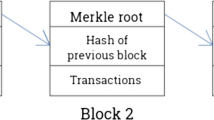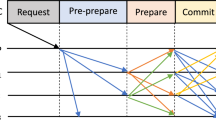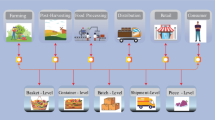Abstract
A transnational network in the agricultural supply chains has surfaced as a result of the development of a large number of stakeholders who are connected to one another via intricate interactions. Agricultural supply chains are plagued by a lack of openness, which is supported by the fact that fraudulent acts are committed on a regular basis. This lack of transparency gives rise to concerns about potential financial losses, disintegration of consumer confidence, and a decline in the company's brand image. These days, customers expect food production systems that put an emphasis on equality, sustainability, and safety respectively. Businesses use platforms such as blockchains and the internet of things in order to satisfy these expectations. Combining blockchain technology with an Adaptive Neuro-Fuzzy Inference System (ANFIS) brought to the development of the SecureTrace3+ protocol, which was designed to fulfil these objectives. For the purpose of identifying potential dangers to a network, SecureTrace3+ makes use of fuzzy control, fuzzy matching, and an improved Composite Controller ANFIS (CC-ANFIS) attack detection model. In order to verify transactions, SecureTrace3+ makes use of fuzzy matching. In addition to addressing the challenges posed by uncertainty, this strategy offers more flexibility in terms of decision-making and transaction approval inside the blockchain layer. When it comes to identifying potential dangers on blockchain and Internet of Things networks, the evaluation findings indicate that the blockchain layer is effective based on throughput and latency measures, but the fuzzy layer is effective based on performance metrics such as accuracy, precision, recall, and F1-score scores.Article title: Kindly check and confirm the edit made in the title.Yes. It is finePlease check and confirm that the authors and their respective affiliations have been correctly identified and amend if necessary.Yes, it is correctly done











Similar content being viewed by others
Data Availability
The dataset produced and examined in this study can be obtained upon reasonable request from the corresponding author.
References
Bamakan SMH, Faregh N, ZareRavasan A. Di-ANFIS: an integrated blockchain–IoT–big data-enabled framework for evaluating service supply chain performance. J Comput Des Eng. 2021;8(2):676–90.
Yazdinejad A, Dehghantanha A, Parizi RM, Srivastava G, Karimipour H. Secure intelligent fuzzy blockchain framework: effective threat detection in iot networks. Comput Ind. 2023;144: 103801.
Aslam B, Javed AR, Chakraborty C, Nebhen J, Raqib S, Rizwan M (2021) Blockchain and ANFIS empowered IoMT application for privacy preserved contact tracing in COVID-19 pandemic. Personal Ubiquitous Comput. 1-17.
Jayakumar D, Kumar KS. Design of mutual trust between the IoT nodes using adaptive network-based fuzzy inference system in edge computing systems. Mater Today Proc. 2022;56:1795–801.
Tsang YP, Wu CH, Dong N (2023) A federated-ANFIS for collaborative intrusion detection in securing decentralized autonomous organizations. IEEE Trans Eng Manag
Vazhuthi PPI, Prasanth A, Manikandan SP, Sowndarya KD. A hybrid ANFIS reptile optimization algorithm for energy-efficient inter-cluster routing in internet of things-enabled wireless sensor networks. Peer-to-Peer Netw Appl. 2023;16(2):1049–68.
Poongodi M, Bourouis S, Ahmed AN, Vijayaragavan M, Venkatesan KGS, Alhakami W, Hamdi M. A novel secured multi-access edge computing based vanet with neuro fuzzy systems based blockchain framework. Comput Commun. 2022;192:48–56.
Pourvahab M, Ekbatanifard G. An efficient forensics architecture in software-defined networking-IoT using blockchain technology. IEEE Access. 2019;7:99573–88.
Almasri MM, Alajlan AM. A novel-cascaded ANFIS-based deep reinforcement learning for the detection of attack in cloud IoT-based smart city applications. Concurr Comput: Pract Exp. 2023;35(22): e7738.
Li J, Herdem MS, Nathwani J, Wen JZ. Methods and applications for artificial intelligence, big data, internet of things, and blockchain in smart energy management. Energy AI. 2023;11: 100208.
Alam I, Kumar S, Kumar M, Kashyap PK (2021) Blockchain based intelligent incentive enabled information sharing scheme in future generation IoV networks
Shynu PG, Menon VG, Kumar RL, Kadry S, Nam Y. Blockchain-based secure healthcare application for diabetic-cardio disease prediction in fog computing. IEEE Access. 2021;9:45706–20.
Balasubramanian C, Singh RLR. ANFIS-BCMO technique for energy management and consumption of energy forecasting in smart grid with internet of things. J Intell Fuzzy Syst. 2022;43(6):7577–93.
Ahanger TA, Tariq U, Ibrahim A, Ullah I, Bouteraa Y. ANFIS-inspired smart framework for education quality assessment. IEEE Access. 2020;8:175306–18.
Ghenai C, Al-Mufti OAA, Al-Isawi OAM, Amirah LHL, Merabet A. Short-term building electrical load forecasting using adaptive neuro-fuzzy inference system (ANFIS). J Build Eng. 2022;52: 104323.
Özkal İ, Özkan İA, Başçiftçi F. Metaverse token price forecasting using artificial neural networks (ANNs) and Adaptive neural fuzzy inference system (ANFIS). Neural Comput Appl. 2023;36:1–24.
Al Sadawi A, Hassan MS, Ndiaye M. On the integration of blockchain with IoT and the role of oracle in the combined system: the full picture. IEEE Access. 2022;10:92532–58.
Sur T, Dhar S, Naskar S, Adhikari C, Chakraborty I. Adaptive neuro fuzzy inference system for monitoring activities in electric vehicles through a hybrid approach and blockchain technology. In: International Conference on network security and blockchain technology. Singapore: Springer Nature Singapore; 2021. p. 291–301.
Javed AR, Hassan MA, Shahzad F, Ahmed W, Singh S, Baker T, Gadekallu TR. Integration of blockchain technology and federated learning in vehicular (iot) networks: a comprehensive survey. Sensors. 2022;22(12):4394.
Chakraborty I. Adaptive neuro fuzzy inference system for monitoring activities in electric vehicles through a hybrid approach and blockchain technology. In: Proceedings of international conference on network security and blockchain technology: ICNSBT 2021, vol. 481. Springer Nature; 2022. p. 291.
Atiewi S, Al-Rahayfeh A, Almiani M, Abuhussein A, Yussof S (2023) Ethereum blockchain-based three factor authentication and multi-contract access control for secure smart home environment in 5G networks. Cluster Comput, 1-18.
Maity M, Sinha AK, Chang S. Q-learning approach to mitigate bacterial contamination in food supply chain. In: International conference on data analytics in public procurement and supply chain. Singapore: Springer Nature Singapore; 2022. pp. 1-7.
Chen H, Chen Z, Lin F, Zhuang P. Effective management for blockchain-based agri-food supply chains using deep reinforcement learning. IEeE Access. 2021;9:36008–18.
Jaison F, Janaki K. An efficient blockchain-based active learning semi-supervised smart contracts in ethereum blockchain traceable food supply chain. Int J Intell Syst Appl Eng. 2024;12(16s):679–89.
Mitani T, Otsuka A. Traceability in permissioned blockchain. IEEE Access. 2020;8:21573–88.
Shahbazi Z, Byun YC. A procedure for tracing supply chains for perishable food based on blockchain, machine learning and fuzzy logic. Electronics. 2020;10(1):41.
Wang L, Xu L, Zheng Z, Liu S, Li X, Cao L, Sun C. Smart contract-based agricultural food supply chain traceability. IEEE Access. 2021;9:9296–307.
Dey S, Saha S, Singh AK, McDonald-Maier K. FoodSQRBlock: digitizing food production and the supply chain with blockchain and QR code in the cloud. Sustainability. 2021;13(6):3486.
Lin Q, Wang H, Pei X, Wang J. Food safety traceability system based on blockchain and EPCIS. IEEE Access. 2019;7:20698–707.
Mishra N, Mistry S, Choudhary S, Kudu S, Mishra R. Food traceability system using blockchain and QR code. In: IC-BCT 2019: Proceedings of the international conference on blockchain technology. Singapore: Springer; 2020. p. 33–43.
Guo J, Cengiz K, Tomar R. An IOT and Blockchain approach for food traceability system in agriculture. Scalable Comput: Pract Exp. 2021;22(2):127–37.
Acknowledgements
We extend our heartfelt thanks to the Jain Deemed to be University, Bengaluru, Karnataka, India for spearheading this research endeavour.
Funding
There is No funding used for this research work
Author information
Authors and Affiliations
Contributions
All authors participated equally in this research.
Corresponding author
Ethics declarations
Conflict of Interest
There is no conflict of interest in this research work
Additional information
Publisher's Note
Springer Nature remains neutral with regard to jurisdictional claims in published maps and institutional affiliations.
Rights and permissions
Springer Nature or its licensor (e.g. a society or other partner) holds exclusive rights to this article under a publishing agreement with the author(s) or other rightsholder(s); author self-archiving of the accepted manuscript version of this article is solely governed by the terms of such publishing agreement and applicable law.
About this article
Cite this article
Jaison, F., Janaki, K. A Novel Methodology for Blockchain Traceable Food Supply Chain Based on the Composite Control Adaptive Neuro Fuzzy Inference System Technique. SN COMPUT. SCI. 5, 1095 (2024). https://doi.org/10.1007/s42979-024-03450-8
Received:
Accepted:
Published:
DOI: https://doi.org/10.1007/s42979-024-03450-8




